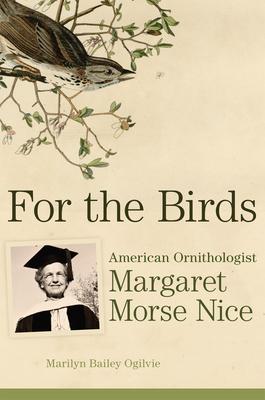A first-rate ornithologist, Margaret Morse Nice (1883-1974) pioneered field studies on song sparrows and advocated for women's active role in the sciences. Yet her nontraditional path toward scientific progress, as well as her gender, meant that she had to reach the highest pinnacles of achievement in order to gain prominence in her chosen field. Luckily for Nice, she was more than up to the challenge. In this engaging first book-length biography, Marilyn Bailey Ogilvie sheds light on Nice's intellectual journey.
The wife of an academic, Nice pursued her own scholarly interests through self-study and by cultivating and creating work partnerships with colleagues. Talented, ambitious, and creative, she did not define herself solely through her role as wife and mother, nor did her family responsibilities deter her from her professional achievements. From her undergraduate study at Mount Holyoke College to her fieldwork in Norman, Oklahoma, her coauthorship of Birds of Oklahoma and subsequent correspondence with George Sutton to her later years in Columbus, Ohio, Nice's career grew in tandem with her personal life-and in some cases, because of it. Although bridled by social constraints, her work spoke for itself: she produced more than 244 papers, articles, and published letters; seven books and book-length monographs; and 3,000 reviews. This voluminous and field-defining output earned her the respect of some of the most important biological scientists of the day, among them Konrad Lorenz and Ernst Mayr, who declared that she had "almost singlehandedly" initiated "a new era in American ornithology."
For the Birds gives Nice her due recognition, lending compelling insight into her activism promoting conservation and preservation, her field methods, and the role of women in the history of science, particularly in ornithology. Nice's life acts as a looking glass into the various challenges faced by fellow female pioneers, their resolve, and their contributions.
